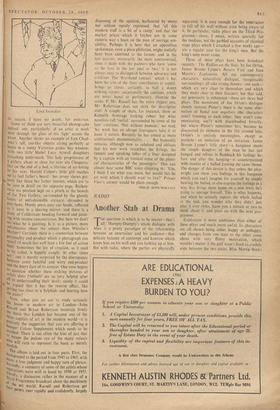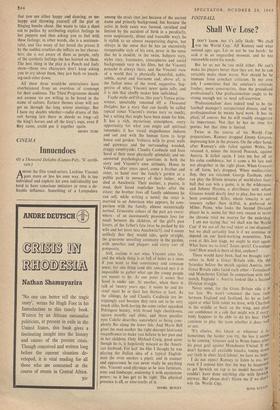RADIO
Another Stab at Drama
'um question is which is to be master---that's Tall.' Humpty-Dumpty's whole dialogue with Alice is a pretty paradigm of the relationship between an entertainer and his audience—that delicate balance of contempt and kowtow which keeps him on his wall and you looking up at him. But with radio, where the parties are physically separated. it is easy enough for the entertainer to fall off his. wall without even being aware of it. In particular, radio plays on the Third Pro- gramme—those, I mean, written specially for the medium, not the garbled accounts of classical stage plays which I attacked a few weeks ago— are a regular case for the king's men. But the king's men never come.
Three of these plays have been broadcast recently : The Ruffian on the Stair, by Joe Orton, James Broom Lynne's Return Visit and Jean Morris's Explosions. All use contemporary characters, naturalistic dialogue, recognisable surroundings; all take strong themes—one each— which are very clear to theMselves and which they make clear to their listeners; but that said, my generosity is exhausted—these are three bad plays. The movement of Joe Orton's dialogue closely imitates Pinter's, there is the same alter- nation of banal non sequiturs (the characters aren't listening to each other, they aren't com- municating, see?). with disembodied ferocity, but where Pinter's sometimes hits, because he discovered its elements in the life around him, Orton's is entirely meaningless, except as pastiche—an imitation of an imitation. James Broom Lynne's little story--a hangman meets the simple daughter of the man he has just hanged and relives in flashback his feelings be- fore and after the hanging—is counterpointed with stanzas of a ballad treating the same theme. The danger of this device is that unless the play- wright can show you feelings in this hangman' which you can't imagine for yourself by simply hearing the ballad, or else express the feelings in a way that brings them home on a new level, he's going to upstage himself. This is what happens, and when he actually repeats the whole ballad at the end, you wonder why they didn't just play it over twice, leave you a minute or two to think about it, and press on with the next pro- gramme.
Explosions is more ambitious than either of these plays and much, more awful. Its characters are all shown being either happy or unhappy, and changes from one state to the other come about with very flimsy motivation, which wouldn't matter if the gulf wasn't fixed so crudely wide between the two states. Miss Morris thinks
that you are either happy and dancing, or un- happy and throwing yourself off the pier or flinging bombs about. She wants to take a short cut to pathos by attributing explicit feelings to her puppets and then asking you to feel with these feelings; in other words, she is a sentimen- talist, and like many of her breed she proves it by the sudden cruelties she inflicts on her charac- ters; she is not aware of them as people, only of the synthetic feelings she has hoisted on them. The best thing in the play is a Punch and Judy show—those two characters don't keep asking you to cry about them, they just bash on knock- ing each other down.
All these three would-be entertainers have overbalanced from an overdose of contempt for their audience. The Third Programme should not assume we are willing to be bored in the name of culture. Earnest themes alone will not get us through the long winter evenings. But I have my doubts whether—radio drama of this sort having lain there in shards so long—all the king's horses and all the king's mgn, even if they came, could put it together again.
HENRY TUBE







































 Previous page
Previous page